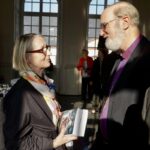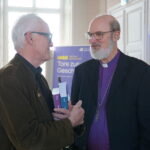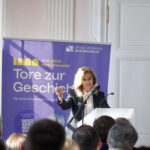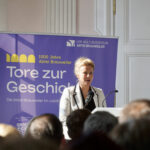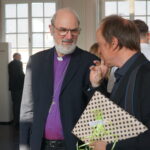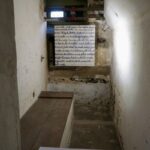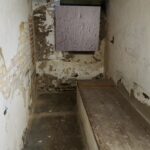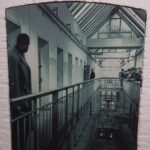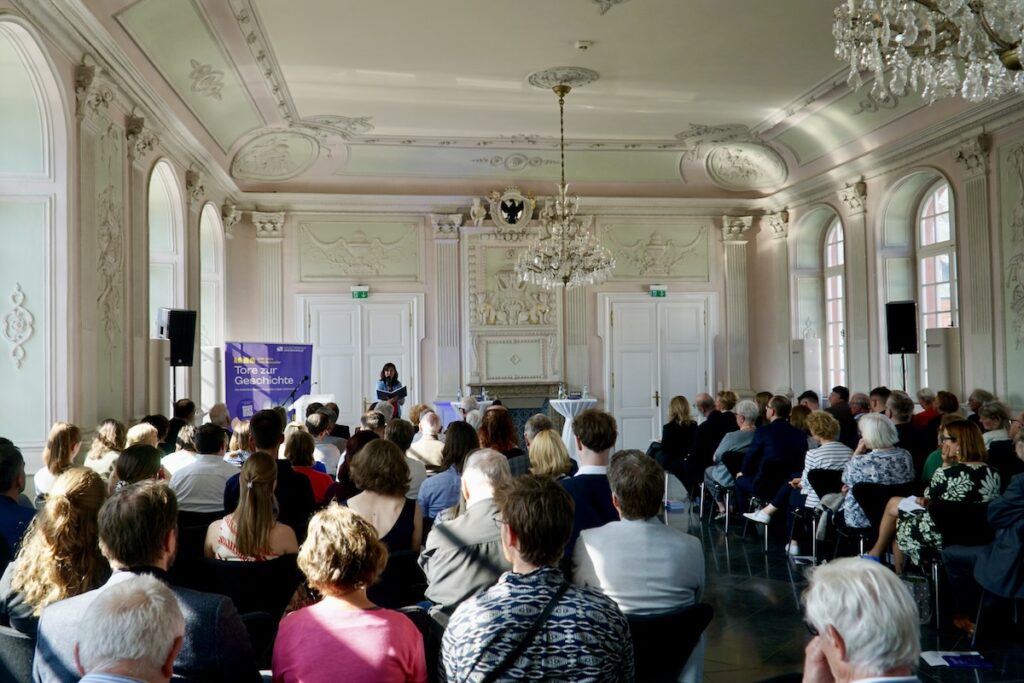
In the presence of more than 160 invited guests, including Bishop Thomas Paul Schirrmacher, Anne Henk-Hollstein, Chairwoman of the Rhineland Regional Assembly (LVR), and LVR Director Ulrike Lubek opened the newly designed memorial on the grounds of the LVR Cultural Centre Brauweiler in Pulheim near Cologne (Germany). Brauweiler was one of the so-called “early concentration camps” from 1933 onwards and was later primarily a Gestapo prison. The opening of the dark chapter of Brauweiler Abbey is part of the celebrations to mark the 1000th anniversary of Brauweiler Abbey, which was secularised in 1806. The memorial was first opened in 2008, but was rebuilt, doubled in size and completely redesigned in 2022–2024. The memorial is dedicated to the memory of the many victims of the regime during the National Socialist era in Brauweiler.
The opening speech was given by Ulrike Lubek, Director of the Rhineland Regional Assembly. She said:
“The LVR, which was founded in 1953, succeeded the 19th century Rhinenian provincial administration in many areas. It is our historical responsibility, our special obligation as it were to unreservedly come to terms with the history of the LVR and the Rhine province, also in order to process it.” “Processing does not only mean documenting what happened,” Lubek continues, “but rather making the incomprehensible and inhumane visible and anchoring it in our collective memory so that humanity as a categorical imperative, enlightenment and critical self-reflection always determine our actions. Remembrance in this sense is therefore also a contribution to sensitisation and prevention against the right-wing extremist and often inhuman positions that are emerging in many places”. Ulrike Lubek addressed personal words to the relatives of people formerly imprisoned in Brauweiler: “Travelling to the place where your family members were confronted with the horrors and brutality of the Nazi state must have been difficult for you. In view of this, we are all the more touched by the fact that some of you travelled from far away. I would like to thank you for this with the utmost respect.”
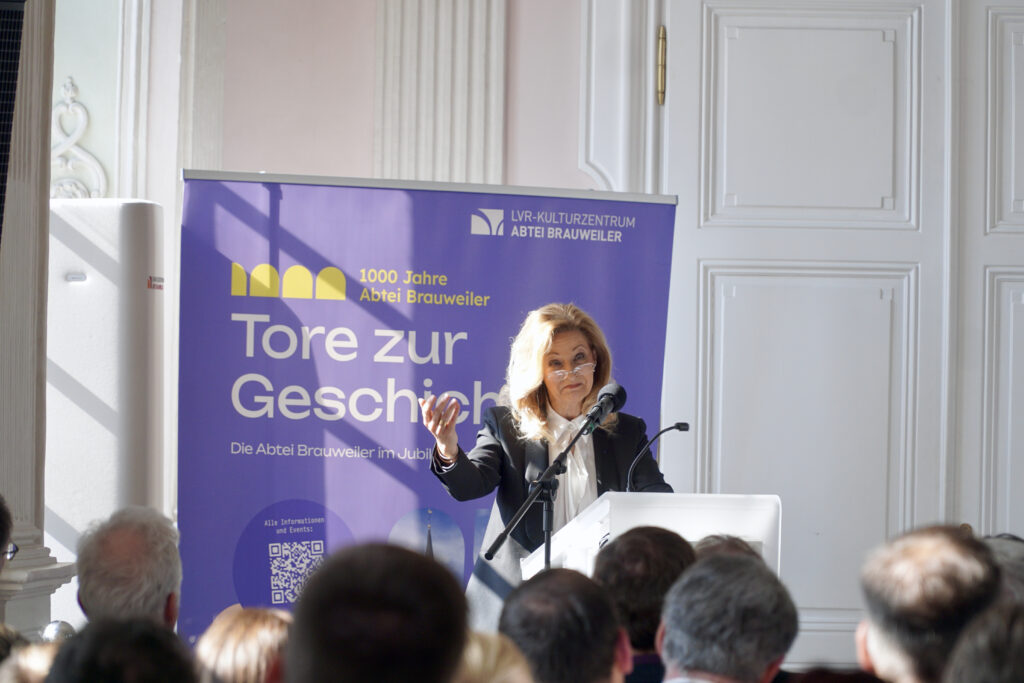
Anne Henk-Hollstein, Chairwoman of the LVR, emphasised:
“For over 150 years, the abbey grounds were a place of exclusion and discrimination, of being locked away and exploited. With its work, the Brauweiler memorial – incidentally also a member of the working group of Nazi memorials and places of remembrance in NRW – is responsible for a piece of remembrance culture. In this way, it makes a contribution to democracy education and to strengthening our free, pluralistic and democratic basic order. In addition to historical documentation and educational work, pausing and raising awareness are central concerns of the memorial. It is the hope of a ‘never again’ that links the memorial work in Brauweiler with research into the history and culture of the Rhineland. Where, if not here, can we start to promote peaceful coexistence?”
Ina Brandes, Minister for Culture and Science of North Rhine-Westphalia (NRW), emphasised the importance of the topic of remembrance culture in the context of the current political situation.
“The current anti-Semitic and xenophobic incidents make it depressingly clear how important the work of the Nazi memorials and places of remembrance in North Rhine-Westphalia is. The state has been supporting this important work for many years. And I am delighted that we can now make a contribution to the redesign of the Brauweiler memorial with the financial support from the North Rhine-Westphalia State Centre for Political Education.”
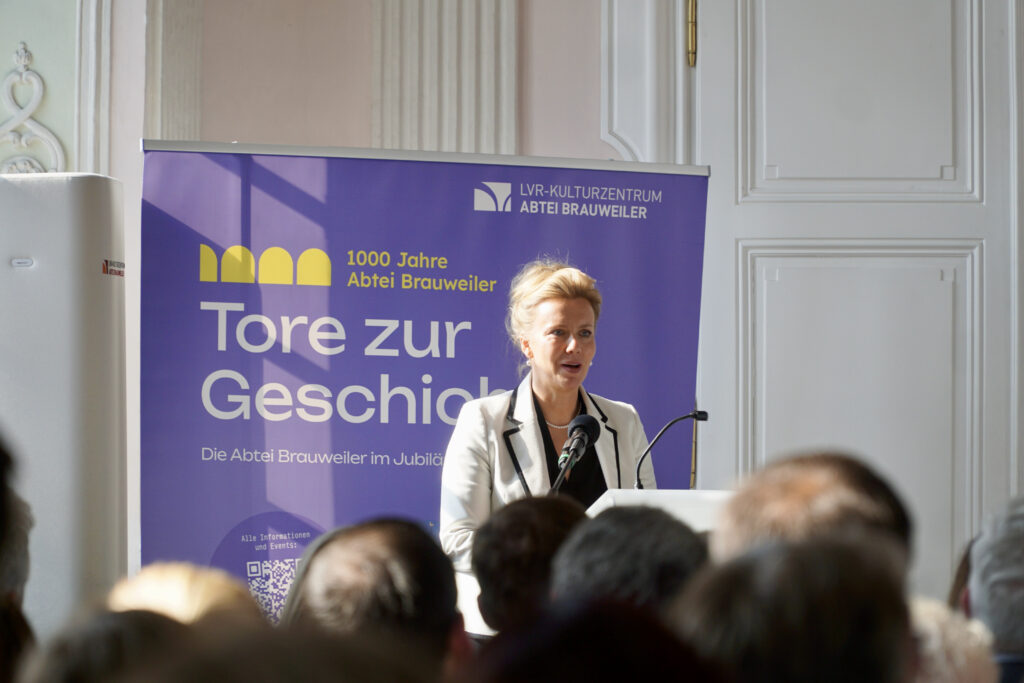
“But it’s only past when you forget it”: Poetry slam about the Brauweiler memorial and the culture of remembrance emphasised the opening with “poetry matrosin” Veronica Scholz. The subsequent discussion was moderated by Dr. Mark Steinert, Head of the LVR Archive Advice and Training Centre, which also includes the Brauweiler memorial. Prof. Dr. Alfons Kenkmann, long-standing chairman of the working group of Nazi memorials and places of remembrance in North Rhine-Westphalia, discussed the forced confinement and violent accommodation of young Edelweiss pirates in the labour camp. Here, the stubbornness and solidarity among the young people clashed with the rigid disciplinary measures imposed by those involved in welfare care education and the Gestapo. “Dealing with the life stories of young people in the 1940s”, says Kenkmann, “gives young people today orientation as they go out into the world”.
Dr. Corinna Franz, LVR Head of Department for Culture and Regional Cultural Preservation, recalled the most famous prisoners in Brauweiler:
“Konrad and Gussie Adenauer were imprisoned here in 1944. Gussie never recovered from the consequences of her suicide attempt during her imprisonment and died in 1948 at the age of just 52. Her fate is representative. Even though only a few people were murdered in Brauweiler, many died as a result of their imprisonment or broke down due to the abuse hand lungs. Konrad Adenauer escaped torture, but the experience left a deep mark on the future Federal Chancellor.”
After the war, Adenauer donated a window for the abbey church. It shows the German Chancellor as Daniel in the lions’ den, surrounded by predators and watched by a person bearing the features of Adolf Hitler.
Dr. Christine Hartmann, responsible for the memorial since 2008 and project manager and curator of the new permanent exhibition, explained the key aspects of the new concept, redesign and spatial expansion. The authentic historical rooms continue to take centre stage as “exhibits”. The LVR Brauweiler memorial is located on the grounds of the LVR Brauweiler Abbey Cultural Centre in the former women’s house of the workhouse, now the LVR office building in a red brick building next to the LVR car park next to the abbey. The exhibition, which is bilingual throughout (German/English), is accompanied by various inclusive offers: Passages from interviews with contemporary and second-hand witnesses can be called up on site using your own smartphone. A translation into German sign language on the smartphone ensures that the exhibition is as accessible as possible. People with visual impairments can have the exhibition texts read aloud to them. The Mediaguide also offers the texts in Polish and French. In addition to the reorganisation of the content and design, the LVR building and property management department has also carried out the structural refurbishment and barrier-free accessibility of the memorial over the past two years. In the past, the memorial was only accessible via a staircase. Now the lift, which previously only provided access to the upper floors, has been extended to the basement. For the first time, visitors in wheelchairs now have the opportunity to visit the memorial. To this end, doors were widened and escape routes were made barrier-free as far as the heritage-protected historic fabric of the building allowed.
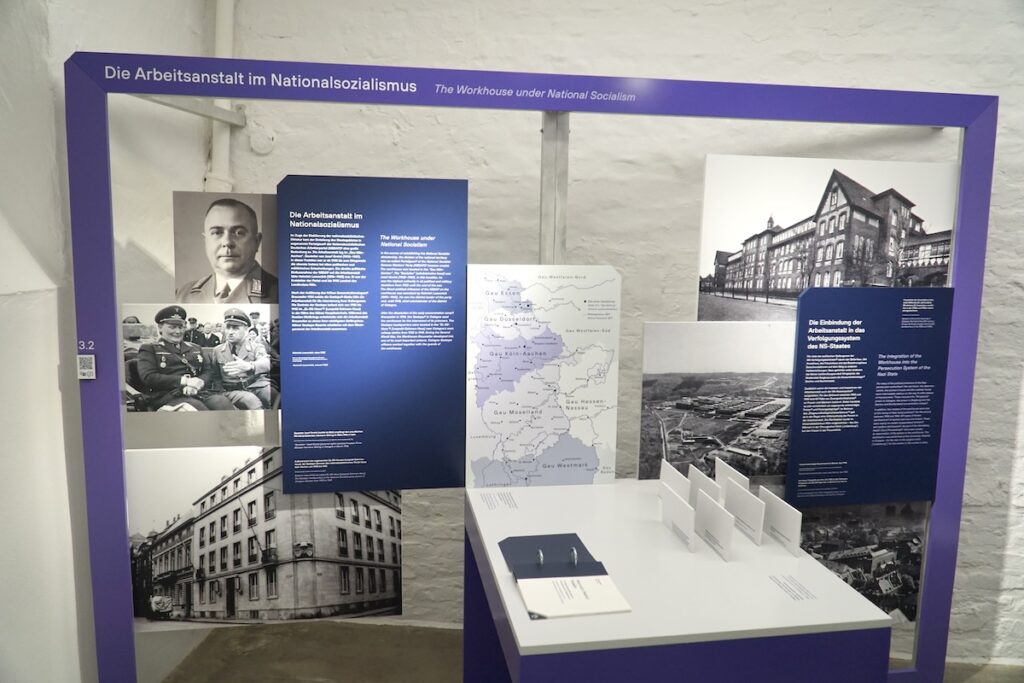
Schirrmacher was invited by the former Minister President of the State of North Rhine-Westphalia, Jürgen Rüttgers, and by the Director of the Rhineland Association, Ulrike Lubek, to speak. He has researched the National Socialist era in two dissertations, one on Hans Naumann, the rector of the University of Bonn, who was dismissed by the National Socialists, and the other on “Hitler’s War Religion” (‘Hitlers Kriegsreligion’, 1995), for which he utilised all of Hitler’s known statements in writing and recordings, especially those that became accessible for the first time in archives of the Eastern Bloc countries after the collapse of the Soviet Union. Schirrmacher presented copies of the two-volume work to the memorial’s archive as well as to several contributors and Jürgen Rüttgers. The latter is chairman of the Association of Friends of Brauweiler Abbey and has long campaigned intensively for the preservation of the abbey and its buildings, for the museum there and for the memorial.
